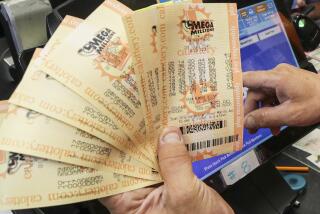Lottery Contract Extension Sought : Corruption probe: The firm was linked to the investigation of ex-Sen. Robbins. But the agency’s chief says it has not been charged with any wrongdoing.
- Share via
SACRAMENTO — State Lottery Director Sharon Sharp has recommended a one-year extension for a multimillion-dollar contract with GTECH, the lottery’s computer system vendor, which has been linked to a bribery case involving former Sen. Alan Robbins.
Sharp said that she knew of Robbins’ allegation that GTECH’s lobbyist routed $13,500 to him in exchange for help in defeating a 1986 lottery bill, but that because the company had not been charged with a crime, she had to make a purely “business decision.”
Nor did the financially troubled lottery have the resources to open up the highly complicated contract to competitive bidding in the short time that would be required, she said.
“We can’t act based on those allegations,” said Sharp, who took over the lottery two months ago. “To my knowledge, GTECH has not been charged with anything. They have a good reputation around the country.”
The extension of the contract, which was worth $29 million to GTECH last year, is scheduled to be taken up by the California State Lottery Commission today, along with Sharp’s recommendations on cutting lottery expenses $19.5 million.
Robbins, a San Fernando Valley Democrat, pleaded guilty in federal court this week to tax evasion and racketeering charges that included the acceptance of a $13,500 bribe from Clayton R. Jackson, a lobbyist representing GTECH. In a statement he read in court, Robbins said the bribe came in the form of a political contribution paid by GTECH. In return for the contribution, Robbins said, he agreed to help Jackson defeat a bill that would have required contractors to print the state’s lottery tickets in California.
Through his attorney, Jackson has denied any impropriety. GTECH officials, speaking from their headquarters in Providence, R.I., denied taking any position on the 1986 bill. They insisted that they had no knowledge of any dealings with Robbins and left it to Jackson to direct their political contributions.
“GTECH steadfastly believes that it is innocent of any wrongdoing in this matter,” Craig Watson, the company’s vice president for marketing, said earlier this week.
Robbins, who has been cooperating with federal prosecutors for a number of months, said his agreement with Jackson also included contributions from GTECH to “the Senate leadership.”
GTECH reported making $305,000 in campaign contributions to state lawmakers in 1986. They included $7,000 to Senate President Pro Tem David A. Roberti (D-Los Angeles), $16,000 to former Sen. Paul Carpenter (D-Norwalk) and $37,500 to members of the Senate Governmental Operations Committee, which considered the bill. Assembly Speaker Willie Brown (D-San Franciso) was listed as receiving $11,000 and former Assembly Republican Leader Pat Nolan of Glendale received $10,500 in GTECH contributions.
Robbins said he voted in favor of the bill--in effect disguising any connection with it--once Jackson told him his vote against it was not needed because the lobbyist had already arranged for the measure to die on the Senate floor.
The U.S. attorney’s office has not named GTECH as a target in its ongoing investigation of political corruption in the state Capitol. After the announcement of Robbins’ intention to plead guilty to criminal charges, Watson said, the company contacted federal prosecutors and offered “to cooperate fully in an investigation that might affect us in order to put an expeditious end to this matter.” However, he said the prosecutors have not acted on GTECH’s offer.
Sharp said that in her negotiations with GTECH, she questioned company officials about Robbins’ allegations and “they denied any wrongdoing.” She noted that GTECH has contracts with 23 of the nation’s 33 state lotteries and that it has performed well operating the California Lottery’s on-line computer games, including Lotto, Decco and Topper.
The company’s initial four-year contract has already been extended for two years. Sharp said the contract allows only one more extension. She said she will be forced next year to put it out for bids.
Negotiations on the new contract were not yet complete Wednesday night, but Sharp said she expected the terms to be more favorable to the lottery than in the past.
“The circumstances were unfortunate but this is a pure business decision,” she said.
Sharp said the renewal of the contract coincides with her decision to cut lottery expenses by $19.5 million because dwindling player interest has caused a sharp reduction in revenues.
The cuts, which are also expected to be approved by the commission today, include the elimination of 100 jobs and a $1.5-million reduction in promotion expenses.
In the meantime, the lottery dropped its Lotto and Topper games Sunday and replaced them with a new Super Lotto game, designed to bring back players by providing a better chance of winning and some larger jackpots.
So far this week, Sharp said, sales of the new game are running 46% higher than last week.
More to Read
Sign up for Essential California
The most important California stories and recommendations in your inbox every morning.
You may occasionally receive promotional content from the Los Angeles Times.










